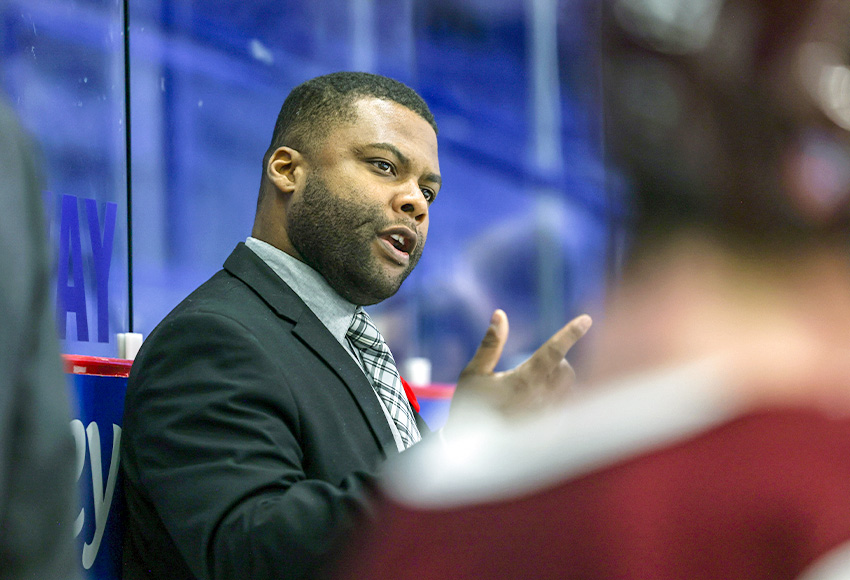Jefferson Hagen
MacEwan Athletics
EDMONTON – Zack Dailey grew up 20 minutes away from an Alaskan town of only 1,000 people that didn't have an indoor hockey rink.
His family had to take a quad three kilometres each way to get to and from their homestead, not accessible by road.
When he started hockey, he was possibly the worst player on the lowest level team in the area.
Yet, against all odds, he made the Western Hockey League at age 16, became a two-year captain of the Everett Silvertips and was part of two University Cup national championships as a player with the Alberta Golden Bears.
Now, here he is, wrapping up his first season as head coach of the MacEwan Griffins, again overcoming the odds to become the only Black bench boss in the U SPORTS men's hockey ranks.
"To be honest, it's a little intimidating to me," said Dailey. "I don't view myself as that, but I understand I'm in that position and it's important. I know as a kid, I really looked up to some athletes like Jarome Iginla, Anson Carter, and Georges Laraque – guys who looked like me and were where I wanted to be.
"I feel like if you see someone who looks like you in a position you want to be in, it makes it possible in your mind. It also helps that I know those guys have gone through the same experiences as me."
In celebration of Black History Month, Dailey's story is amazing and inspiring, proving high character, hard work and overcoming adversity leads to opportunities for success.
•••
In the early '90s, Dailey was the little fella who tagged along when his older brother Pat had outdoor practice in Healy, Alaska.
"As any little brother wants to do, they want to be like the older brother," said Dailey. "I'd have to go to practice and watch him, so I'd bring my stick. That was the thing in Alaska is you'd play soccer in the summers and hockey in the winters. If I wanted to be around my friends, those were the activities you had to do."
So, he signed up for his first team at age 7 – admittedly late by Canadian hockey standards – and was playing at the 'D' level, the lowest tier in Alaska.
"I started out not very good – definitely one of the worst players on the team, so I was purely there to be with my friends and not super driven by the sport itself," said Dailey.
"That being said, after a couple years, something clicked. Three years later, I was one of the best players on the 'A' team. It was kind of a quick improvement, but I think that's really where I fell in love with it – when the competition started to get a little better."
It's an astounding improvement from ages 7-10, but it didn't happen by magic. Uniquely, his father John would film his skating stride and send it to a power skating coach in Fairbanks, about two hours away.
"A lot of credit goes to my dad," said Dailey. "The next time we had to go into town for groceries or whatever, we'd meet up with the skating coach. They'd watch my video; they'd give me pointers on what to work on and we'd go back to our outdoor rink in our small town and work on those. That was pretty a much all-winter process.
"That really paid off for me. Once the skating came, everything came after it. I think that was the biggest thing is I fixed my skating and it kind of took off from there."
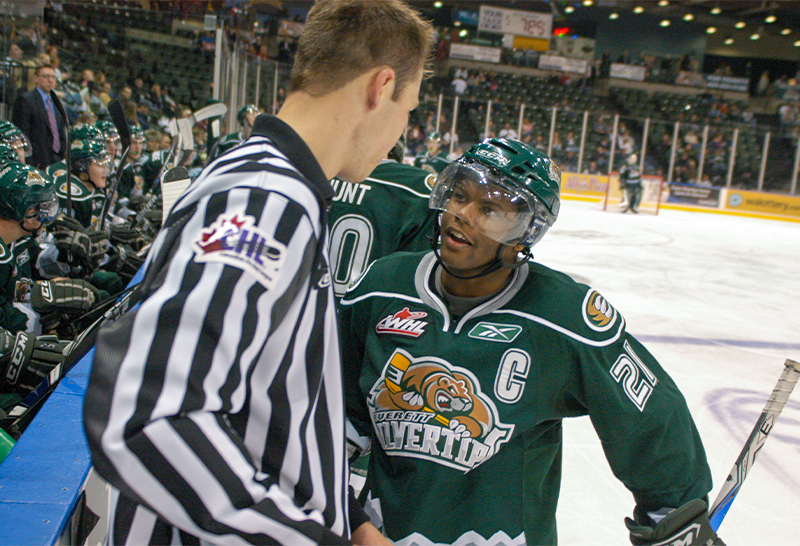 Zack Dailey was captain of the WHL's Everett Silvertips for two of his five seasons there after making an astounding rise from obscurity growing up in remote Alaska (Courtesy, Everett Silvertips).
Zack Dailey was captain of the WHL's Everett Silvertips for two of his five seasons there after making an astounding rise from obscurity growing up in remote Alaska (Courtesy, Everett Silvertips).
Off the ice, his perseverance and work ethic were being moulded by the challenges of living in remote Alaska. Every morning, to get to school, they'd have to start the quad by any means possible – which sometimes including boiling water to pour onto the frozen starter to get it going in mind-numbing freezing temperatures.
"Every day we'd park our car in the garage and take a quad to the house – about a three-kilometre quad ride in," he said. "As you can imagine in the dead of winter in Alaska, that wasn't super enjoyable. But it was a pretty unique and cool experience, and something I will hold onto dearly in my memory.
"It's always fun to go back and visit, but it was a very tough lifestyle, for sure."
Because of the trek just to get to the outdoor rink in Healy, there was no quitting on practice when the temperatures plummeted.
"It was an outdoor rink, so there'd be times when it was minus-25 and we're leaving the house and (my parents would say) 'if we're going, we're skating. Are you good?' We usually stayed out there until -30 and that's where we'd draw the line. But there were a lot of cold practice nights where you were in the warmup shack four or five times during your practice.
"When I started to love it, I would just stay," he added. "I practised with my team and then I'd practise with the year older (group). I'd usually get about three hours of ice time when we'd go into town, so that part was great."
Years later, Dailey realized that was what forged many of the elements in his game.
"I think just gritty is the word for it," he said. "I think 'nothing's easy' is how I was raised. We had to grind for some stuff, and I think that paid off. I think that's actually how my style of hockey was when I got older.
"I was maybe not the most skilled player, but I tried to make up for that with my work ethic and determination and tried to outwork people."
•••
The MacEwan Griffins were a scrappy and plucky squad this season, moulded in the image of how their head coach once played – a team that found success when they outworked their opponent.
As a result, they made history as the first squad in program history to qualify for the Canada West playoffs. The Griffins clinched on Feb. 3 with a 7-2 thrashing of the Manitoba Bisons and the celebration was on, albeit brief.
"Dales is a hard-working guy, and it was down to business (quickly)," said captain Kole Gable. "But he came into the dressing room – 'congratulations, soak it in for the night.'
"We were pumped and excited for that moment, but we had a game the next day, so it was right back to business, back to work."
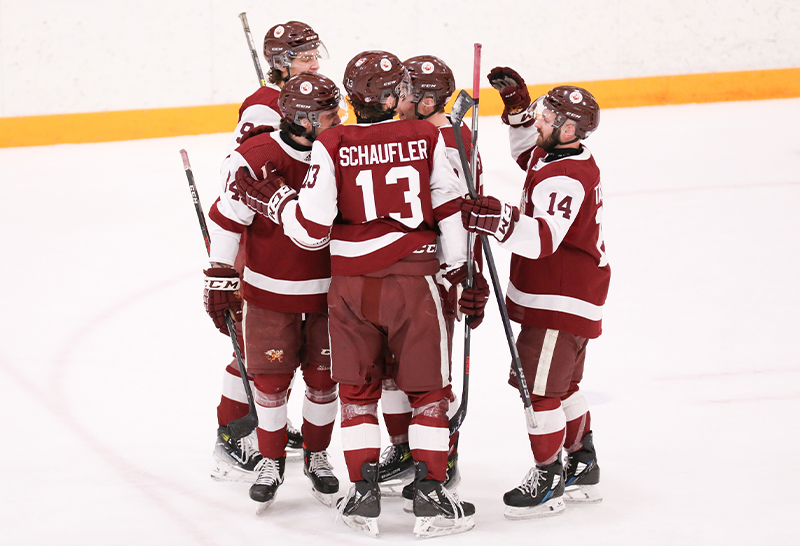 The Griffins celebrate one of seven goals they scored against Manitoba on Feb. 2 to clinch a playoff spot (Dave Mahussier photo).
The Griffins celebrate one of seven goals they scored against Manitoba on Feb. 2 to clinch a playoff spot (Dave Mahussier photo).
Gable, one of just a handful of players left from the program's Alberta Colleges Athletic Conference era, said it was easy to buy into what Dailey's plan for them, even though he was a rookie head coach this season.
"When you meet Dales, he's just the hardest-working, most caring guy," he said. "It's pretty easy to follow him. Guys I've played with the last few years would go through a wall for him, I know that.
"It wasn't hard for us to buy into what he's saying because you respected him so much already, it was easy to follow his lead."
On the flip side, Dailey can't thank his players enough for their support as he transitioned to full-time head coach in 2023-24 after one season as interim bench boss, and five previous years as an assistant coach.
"The players have been great," he said. "There's been so much support from them. I think any time you go from an assistant coach where maybe your relationship with a player is different than the head coach, then you kind of switch roles but have the same players there, it can lead to some issues. But (the veterans) have respected me so much and have listened to me, they've bought into what I'm asking them to do. It's helped get other guys on board.
"I think every coach knows you're only as good as your players and you're only as good as your buy in. I think I've got fantastic buy in. I'm very happy with the support from my players and they've definitely made me look good the last couple years."
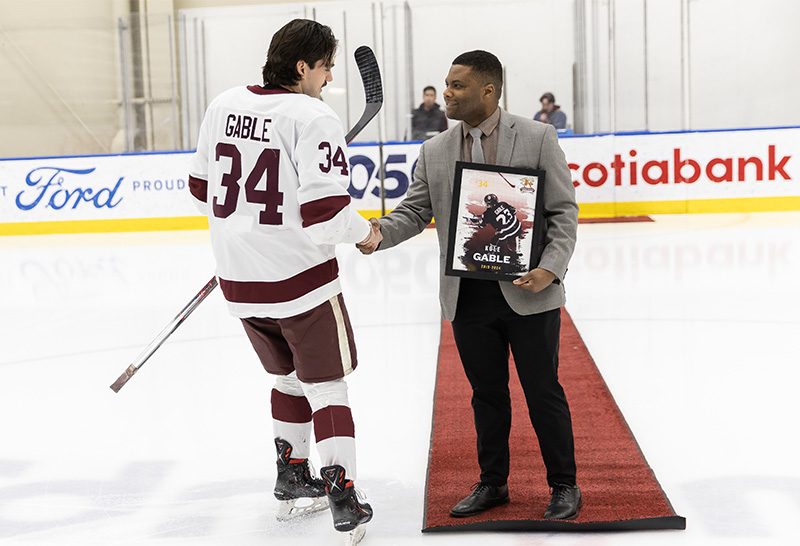 Zack Dailey presents graduating senior Kole Gable with a picture to commemorate his time wit the Griffins during their last home game on Jan. 27 (Rebecca Chelmick photo).
Zack Dailey presents graduating senior Kole Gable with a picture to commemorate his time wit the Griffins during their last home game on Jan. 27 (Rebecca Chelmick photo).
•••
Making the A level in Alaska was a big deal, but all it really did was whet Dailey's appetite for more. When his Healy team travelled to Fairbanks, they'd watch the local university squad play NCAA Div. 1 games and study up on who the players were and where they were from.
"We're looking at the roster and it was filled with guys from the AJHL," he said of the Nanooks. "At the time, we had no idea what that was, so we went on the computer and googled it. We found an Alberta Junior Hockey League, so we said, 'well, that must be where they develop hockey players.' "
That put Alberta, in general, on the radar for Dailey and his family bought into his dream.
"My dad said 'are you serious about that? Is that a path you want to go down?' So, we met as a family. It was kind of between soccer and hockey.
"To be honest, I thought I was better at soccer at the time, but I had some foot issues with my heels, and it was a little easier on my body, believe it or not, to play hockey."
His big break came while playing spring hockey for the Northern Alberta All-Stars.
"I got noticed at one of the spring tournaments by the Leduc AAA coach," said Dailey, "and he's like, 'have you guys ever thought about moving here for hockey?'
"So, we moved without a guaranteed spot, just hoping I could make it. It was pretty enjoyable and a pretty stressful process, to be honest. In Alaska, there were maybe 20 kids trying out for a team of 15, so there weren't a lot of cuts. Coming to Alberta where there were 100 kids trying out for a team was pretty intimidating, especially being in a different country.
"The whole process was a good one. I learned a lot and I ended up making the team. Hockey kind of took off for me at that point."
Dailey had 39 points in 35 games for the Leduc Sun Oil Barons as a first year in Bantam AAA. The next season, his WHL draft year, he scored 41 goals and added 52 assists in just 39 games for the Sherwood Park Flyers, and won an AMBHL MVP award.
"My draft year, I went to Vimy Ridge, so I had some great instruction there," said Dailey, who later ended up working for the local academy. "And I had some pretty darn good linemates and a good team in Sherwood Park. Our (MacEwan) goalie coach Kurtis Mucha was on my team that year, so that's where the friendship started, way back in bantam.
"I had a very, very successful year, had a lot of fun and it just seemed like everything started to click. The shots were going where you wanted them to, it seemed like I was faster than people … the game definitely started to click for me there. Luckily, I had a great year and got drafted by Everett."
In the third round, no less.
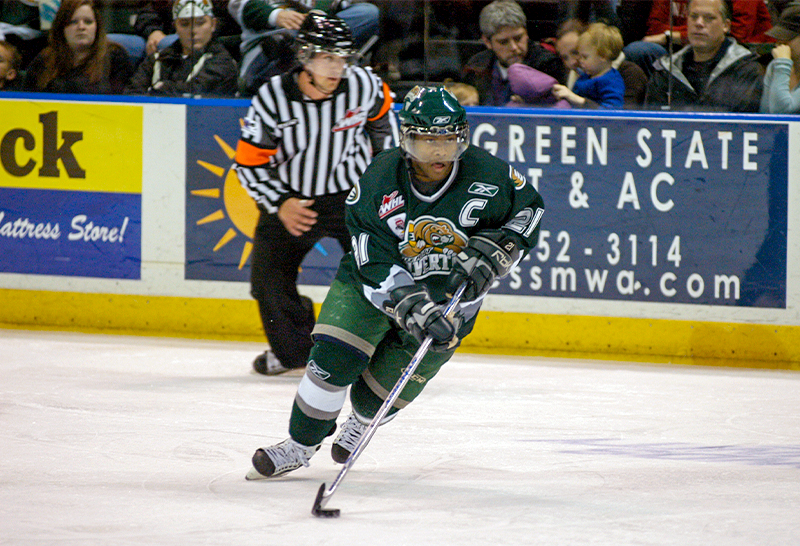 Zack Dailey was drafted by the Everett Silvertips in the third round of the 2004 Bantam Draft and went on to play 373 games for the organization (Courtesy, Everett Silvertips).
Zack Dailey was drafted by the Everett Silvertips in the third round of the 2004 Bantam Draft and went on to play 373 games for the organization (Courtesy, Everett Silvertips).
•••
Hockey has come a long way in removing racial barriers, but Dailey endured many challenges trying to make it as a Black hockey player.
Like so many who made it to the higher levels before him, diversity and inclusivity weren't at the level they are today in the game.
That's why representation mattered to him. That's why it still matters today that he's in a position that can inspire others.
"It's hard, it's really tough at times, but I'm not the first one doing it," said Dailey of his journey. "There have been others who've persevered and gone through it. I just know it's possible.
"So, if there are any kids out there who want to coach and they didn't think it was possible, hopefully seeing me inspires them and lets them know that they, too, can do it and they belong in the coaching space in hockey, and the playing space, as well."
The first Black U SPORTS men's hockey head coach was Darren Lowe, who coached the University of Toronto for 22 years before retiring in 2017.
The first Black NCAA men's hockey head coach was Ed Wright, who coached 13 seasons at the University of Buffalo, starting in 1970.
Over the years, several Black coaches have earned opportunities at various levels of hockey, but they are few and far between. There has been only one Black NHL head coach in history when Dirk Graham was bench boss of the Chicago Blackhawks for 59 games in 1998-99.
"Honestly, I didn't know there were any black coaches in pro hockey," said Dailey. "Just since I started coaching, I read about some guys. Joel Martin is the East Coast League (Kalamazoo Wings) and I've seen some videos of him. There's another gentleman who was an assistant coach in the NHL (Paul Gerrard, who passed away last year from cancer). I've watched a lot of videos on him.
"I don't know if role models is the right word because I've just discovered these guys, but again when you see someone in a place you potentially want to get to one day and they look like you, and you know it's possible, it's pretty cool to see that.
"I'm sure they've gone through experiences that are super tough and always being the first to do something is very, very tough and scary, but it definitely inspires people behind them to do the same thing."
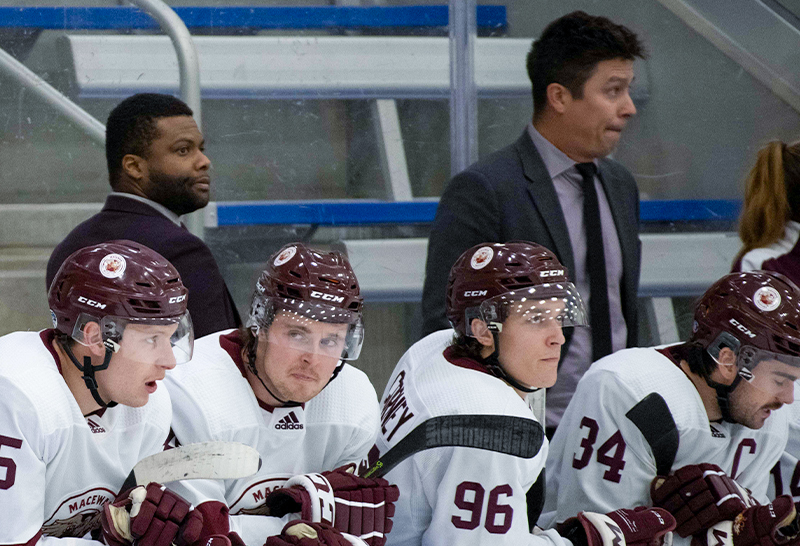 Zack Dailey, left, is one of few Black head coaches in hockey and is the only one in U SPORTS (Derek Harback photo).
Zack Dailey, left, is one of few Black head coaches in hockey and is the only one in U SPORTS (Derek Harback photo).
•••
After attending his first WHL camp at the age of 14, Dailey was told by the Everett Silvertips that the plan was to bring him along slowly, that he wouldn't play for them until age 18.
In his mind, Dailey thought pursuing an NCAA scholarship might be a better route for him then. He returned to Sherwood Park and made the Midget AAA Kings but broke his wrist in tryouts.
As he dealt with that, his instructors at Vimy Ridge (Steve Hamilton, Dan Auchenberg and Ryan Marsh) also happened to be coaching the Fort Saskatchewan Traders in the AJHL. He was asked to affiliate for 19 games.
"I think that put a little pressure on Everett," said Dailey. "Once I played those games in the AJHL, after the season, they said, 'we want you to sign and play on our team next year as a 16-year-old.'
"I was like 'what happened to this 18-year-old plan you guys had for me?'
"So, not really sure what changed there, but I was lucky enough to make Everett as a 16-year-old. The journey of junior hockey began, and I had five great years there. I really enjoyed playing there."
Everett was a rig during his tenure, making the playoffs all five of his years (2005-10), their best being a trip to the conference semifinals when he was a rookie. He was the Silvertips captain during his final two seasons.
"I had some NHL calibre coaches, lots of teammates who played in the NHL, so great experiences there," said Dailey. "Really great billets who I still talk to today and were at my wedding. So, it was a really good experience for me in Everett."
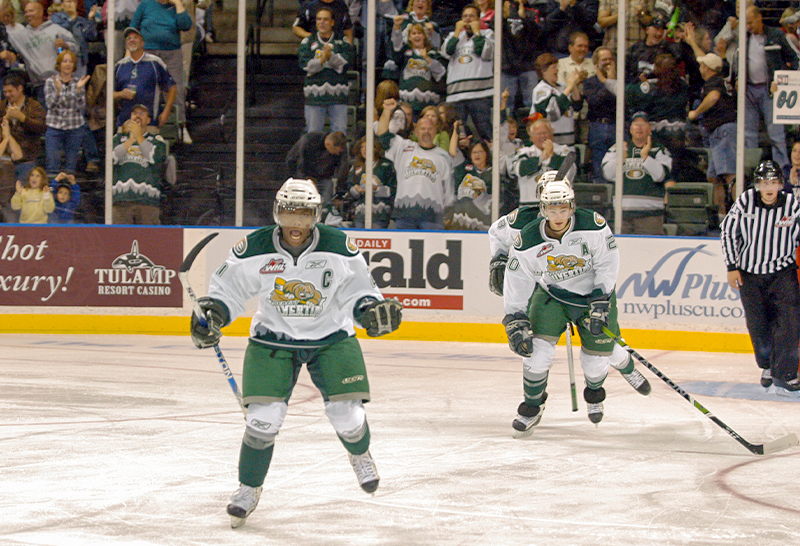 Zack Dailey celebrates one of his 43 goals he scored for the Everett Silvertips over a five-year career. He also finished with 146 career points (Courtesy, Everett Silvertips).
Zack Dailey celebrates one of his 43 goals he scored for the Everett Silvertips over a five-year career. He also finished with 146 career points (Courtesy, Everett Silvertips).
Some of the high-level players who were his teammates include former Edmonton Oilers defenceman Ryan Murray, Anaheim Ducks blueliner Radko Gudas, former NHLer Peter Mueller and top NHL draft picks Leland Irving, Zach Hamill, and Kyle Beach.
"I think at one time we had five NHL first round guys on our roster," said Dailey. "So, we had pretty good teams when I was in Everett."
Later, Dailey would play with current Edmonton Oilers forward Derek Ryan on the Alberta Golden Bears – an old friend he sometimes runs into at the Downtown Community Arena where both the Griffins and Oilers practise.
Ryan's last year with the Golden Bears was Dailey's first, while Griffins assistant coach Sean Ringrose was also a key member on the team that captured the 2011 Canada West championship. Over Dailey's tenure in Evergreen and Gold (2010-15), they won three more CW titles and were national champs in 2014 and 2015.
"I figured out at a pretty young age that I wasn't good enough to make the NHL, so I started looking at what the next step was," said Dailey. "U of A was in Edmonton and had won a bunch of national championships. I thought for me that was my best option. So, I went to U of A, and it was a great experience.
"I found the transition from being a junior hockey player to a student to be quite hard. Being out of school for a number of years and not having a whole bunch of responsibility to a tough school with a bunch of responsibilities for the team and travel, it was a tough time for me to start, but I got the hang of it and ended up winning a couple national championships, so I had a great experience at U of A."
•••
Coaching wasn't on the radar for Dailey when he was a graduate from the U of A. Like many who play in U SPORTS, the lure of pro hockey extended his playing career as he signed up with the Huntsville Havoc in the Southern Professional Hockey League.
"If I were to tell you I planned on being a coach right when I graduated, I'd be lying to you," said Dailey. "I wasn't really sure what I wanted to do. My first goal was to try and play professional hockey and that didn't work out for me. So, I was helping out at Vimy Ridge. I really enjoyed being with the kids and helping them get better. I felt that I had a lot to give back and a lot of knowledge to share with those kids."
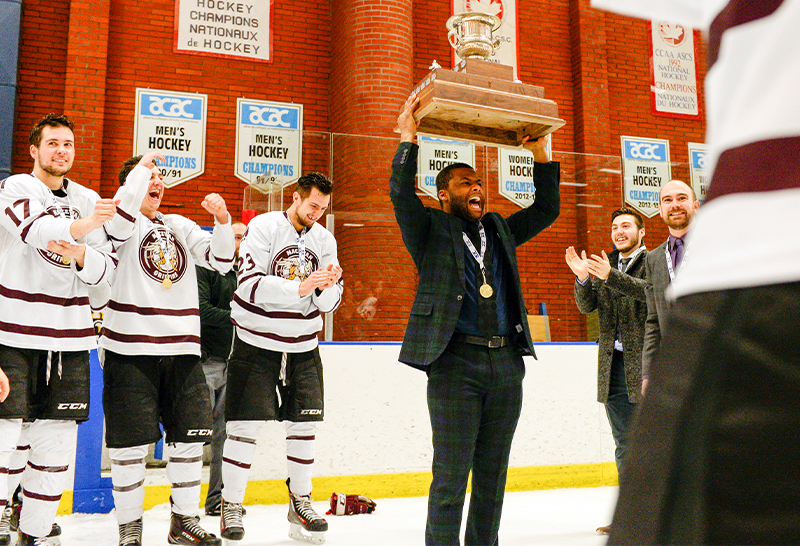 In his first season as an assistant coach with the Griffins, Zack Dailey helped head coach Mike Ringrose and the team capture their second of three-straight ACAC Championship trophies (Len Joudrey photo).
In his first season as an assistant coach with the Griffins, Zack Dailey helped head coach Mike Ringrose and the team capture their second of three-straight ACAC Championship trophies (Len Joudrey photo).
The head instructor there was Mike Ringrose, who became head coach of the Griffins in 2017. He asked Dailey to join his coaching staff as an assistant.
"It was a little bit late in the summer and I don't know this for a fact either, but I don't think I was his first option," said Dailey with a laugh. "I do know when he came calling for me, it was an opportunity I knew I wanted to jump on. I really like the age group of university kids. They're very smart, very dedicated, they want to get better."
Dailey can't thank Ringrose enough, who immediately gave him responsibility for the penalty kill and defensive line changes as a way to get his feet wet to see if coaching was for him.
"It was something I did enjoy," said Dailey, who helped both Ringrose brothers guide the Griffins to back-to-back ACAC Championships (2018 and 2019).
He also used his knowledge of being a student-athlete, familiar with how challenging it is balance the tough academic and athletic workload.
"I think that helps me a whole bunch at a coach, especially at this level that I've been where they've been," he said. "I understand it. There are times during exam weeks when our practices are off. I think back to when I was super stressed about whether I was going to pass an exam or not. So, I have a little bit more understanding.
"I definitely think it helps me as a coach being able to relate to them and remembering what it was like to be in their shoes."
It also set the tone for how relatable he is with his athletes. That's a trait that makes it easy to cheer for him, said Gable.
"This year, we were all excited for him to get the job," said Gable after Dailey was in an interim role in 2022-23. "All of his accomplishments and what he's gone through, how he even got here to be coaching – we all bought in. He cares about the team so much; it was nice for our seniors to make the playoffs in our last year and for him in his first year as head coach.
"That's the foundation now, that's the expectation, so it's kind of worked out good for all of us."
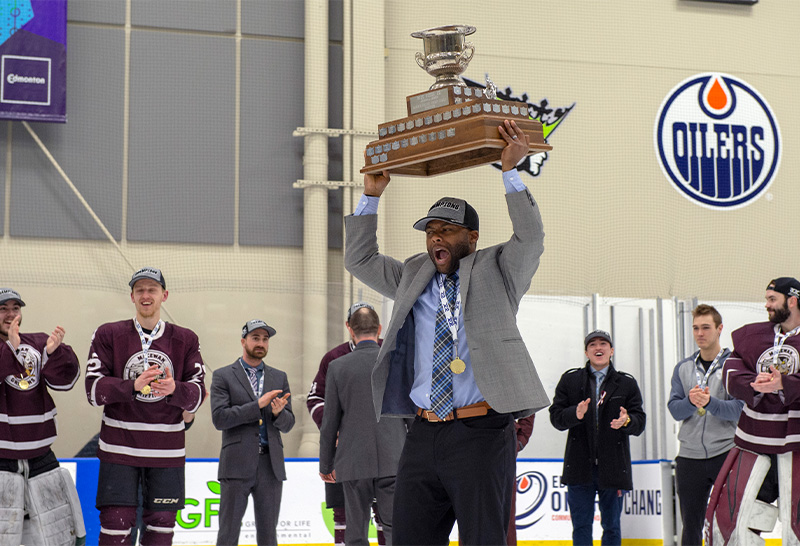 Zack Dailey hoists the 2019 ACAC Championship trophy - the Griffins' third-straight - after they beat NAIT at the Downtown Community Arena. He became head coach of the Griffins in 2023 (Len Joudrey photo).
Zack Dailey hoists the 2019 ACAC Championship trophy - the Griffins' third-straight - after they beat NAIT at the Downtown Community Arena. He became head coach of the Griffins in 2023 (Len Joudrey photo).
Among his takeaways after his first season are how important recruiting is, especially adding good people to your organization. He realized how it's OK to make mistakes and learn from them. And Dailey was blown away by how amazing the whole coaching group is at MacEwan.
"I kind of lucked out with this head coaching (opportunity)," he said. "I had no idea that we'd be moving to U SPORTS. My plan was to be with Ringer for a very long time and maybe if he moved on in his 50s, I'd take over after that. But everything happened a little bit quicker than expected.
"I definitely feel fortunate to be in this position, but I also feel qualified, I feel prepared, and I feel that I belong here, as well."
